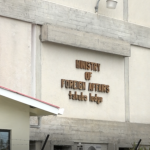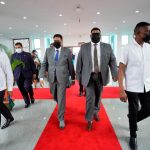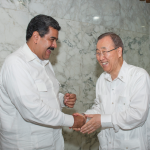
President David Granger and a Government team met this morning with a visiting delegation of US Congressmen and other US officials.
The issues of Guyana’s emerging oil and gas sector as well as the border controversy with Venezuela were among the items that were discussed, according to a statement from the Ministry of the Presidency.
The US team was headed by Republican Congressman Bob Goodlatte and included other Republicans and Democratic Congressmen.
When the meeting ended, the President described it as a ‘fact-finding’ mission.
He said in his brief to the team, he presented a a geographic overview of Guyana, its hemispheric affiliations and shared borders; a strategic outline, which outlined the Guyana/ Venezuela Border controversy, territorial controversy with Suriname, Guyana’s international relations and the migration of Venezuelans into Guyana; an economic overview, which dealt with the traditional sectors, the emerging oil and gas sector and Guyana’s pursuit of a ‘green’ agenda and environmental conservation.
“I dealt with the geographic scenario and the fact that Guyana is a continental state. It is a part of the South-American continent but with Caribbean characteristics. It’s the only English-speaking State and as a result of that we have lots of advantages, but at the same time, you know, we are not only perceived as the gateway to South America for the Caribbean but we’re the gateway to the Caribbean for South America. Our geographic situation has, of course, implications for border security because of the territorial claim by the Bolivarian Republic of Venezuela and also claims by Suriname. So, they were interested in that and I gave them the assurance that we are on our way to the peaceful resolution of the territorial controversy with Venezuela,” President noted.

He also briefed the US officials on Guyana’s political and governance systems.
“The [other] area I dealt with was political. I gave them the assurance, truthfully, that Guyana is a very stable country, law-abiding country, and our National Assembly functions, our judiciary functions independently and also the executive branch. So, those three branches are separate and the executive does not interfere in the judiciary or the autonomous commissions, like the Guyana Elections Commission, the Judicial Service Commission and so on. So, I think from the point of view of governance, we were able to explain that Guyana is a stable, well-governed state,” he said.
He said the US Government officials also learnt of the Government’s “green agenda” and “were quite impressed with our environment [and] our commitment to the environment.”
The President said the two sides also discussed areas of cooperation, which can be built and enhanced where needed, in areas such as security, energy and disaster response and preparedness.
“The territorial controversy has been our biggest concern but most recently, and because of our long borders we have a 1,300 feet kilometres with Brazil, 800 kilometres nearly with Venezuela and also with Suriname, but we don’t have the assets to protect our borders and there has been some trafficking across the borders; trafficking in guns, trafficking in persons, trafficking in narcotics and trafficking in other contraband goods. These are areas where there could be deeper and more intense corporation between the United States and Guyana. Also, we are aware of the repeated danger of hurricanes and other disasters in the Caribbean and the United States has assisted us, particularly the Civil Defence Commission, in preparing for disasters and management of disasters. Again, this is one area that we want to continue our collaboration with the United States because we don’t have the airlift or the technical capabilities to respond to these disasters,” President Granger said.

He noted too that the Congressmen particularly have expressed interests in the energy sector and the possibility of access to cheap electricity for Guyanese and other stakeholders.
“We explained that we’re not wedded to one concept. Some areas may have solar, some areas may have hydro, some areas may have wind, some areas may have natural gas so we’re looking at a mix of energy sources and we’re confident that we’ll bring the tariff rate down to below US$0.15 cents per kilowatt hour. Maybe we’ll keep moving downwards and have cheap energy and this will be important to manufacturers. So some of the questions were concerned with the possibility of cheap energy,” the President explained.
Vice President and Minister of Foreign Affairs, Carl Greenidge and Minister of State, Mr. Joseph Harmon were also present in the meeting.
The visit by the US Congressmen represented the largest team of US Congressmen to ever visit Guyana. They arrived in Guyana on Wednesday and had lunch with youth group representatives and other civil society members before being briefed by the US Ambassador and meeting with Guyana’s Minister of Natural Resources.

















You must be logged in to post a comment Login